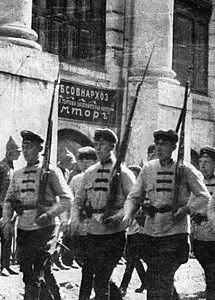Amtorg's Spree: торговля золотом с США

Выкладываю небольшую заметку из издания The TIME за 19 февраля 1940 года. Чтобы не портить дело маслом, оставил ее на языке оригинала. Особо замечу, что в иностранной прессе 30-40-х годов содержится масса интереснейшей информации по сотрудничеству Запада с СССР. В этой заметке из примечательного можно выделить отношение американцев к войне между СССР и Финляндией (его сложно не назвать лояльным в отношении Москвы). Что касается бизнеса, то после длительных переговоров в 1935-1937 годах СССР и США согласовали свои позиции по торговле золотом, которое США выкупали напрямую из СССР или через третьи страны (часто - через Швейцарию). Желтый металл частично оплачивал советские закупки в Соединенных Штатах.
Стоит также подчеркнуть, что американские данные о масштабах золотодобычи в СССР в 30-е годы всегда были почему-то явно завышенными. Так, в 1936 году министр финансов США Моргентау в разговоре с советскими диппредставителями обмолвился о том, что у СССР золото-валютные резервы якобы составляют аж 6 млрд. долларов.
На самом же деле масштабы золотодобычи в СССР были намного скромнее и за 1937-1940 годы непосредственно США (основной покупатель металла в мире) выкупили у Советской России золота лишь на 100 млн. долларов.
Amtorg's Spree
The TIME
Monday, Feb. 19, 1940
Last week the 5,114-ton Russian motor-ship Kim put into San Francisco from Vladivostok, unloaded $5,600,000 of gold bullion, sold it to the San Francisco mint. First gold shipped directly from Russia to the U. S. since 1937, it was a mere twentieth of the $101,900,000 of Russian gold bought by the U. S. (through other countries) in that time. Kim's arrival served Senator Vandenberg with occasion for lambasting the Administration's gold policy ("Folly ... we do not want the gold") on the floor of the Senate. But to newsmen it served to spotlight the surprising trend of U.S.-Soviet trade.
Badly needing U.S. heavy machinery, machine tools, molybdenum, steel sheets, etc. Russia has been regarded as a good customer by U.S. exporters, has paid them $566,000,000 (mostly cash on the line) in the last ten years. Henry Ford alone has made $20,000,000 of sales to Russia, including the dies and stampings of his old Model A. Russia sells less to the U. S. (furs, manganese, platinum), has a large "unfavorable" trade balance, readily cancelable by gold, of which she mined around $200,000,000 worth last year. But by last week Russian business was shocking U. S. sympathies with Finland, giving some U. S. exporters a bad conscience (see p. 16). One manufacturer called the American-Russian Chamber of Commerce in New York, announced he had decided not to bid on a certain contract, mentioned Finland. Challenged the Chamber: "Do you refuse to sell to a man because he beats his wife?"
Since last summer, U. S. exports to Russia have soared from around $3,500,000 a month to $8,600,000 (October), $7,300,000 (November), $10,500,000 (December), showed no signs of slackening. Chief reasons for the increase: 1) Russia's former suppliers, notably England, no longer have so much to sell; 2) emergency buying, due to war. Chief item in the increase: copper, of which $6,083,854 has gone to Russia since Oct. 1. Rerouting imports away from the dangerous Atlantic, Russia now sends ships (her own, Norway's, others') to West Coast ports, where U. S. ships meet them for transshipment. Chief transshipment point: Manzanillo, a small (pop. 3,669), unhealthy Mexican harbor, unnaturally busy, playing host to an unusual number of barnacled Soviet hulks. Kim, having deposited its gold, headed for Manzanillo and a return load last week.
Copper, essential to munitions, is not on the U. S. War Department's list of strategic materials because the U. S. has plenty. But Russia's buying spree has brought some U. S. exporters less innocent profits. Few weeks ago New Yorkers were selling spot rubber and pig tin (both of which the U. S. must import) for reexport through Amtorg, chief U. S. purchasing agent of the Soviet Government. War and Navy Department officials, having failed to build stockpiles of these essentials, cracked down with a "moral embargo." Said they, nipping one 500-ton sale of pig tin in the bud, ". . . Unless the method of voluntary cooperation can be counted upon to operate with complete effectiveness it will become necessary to use other means." U. S. heavy industry experts, their talents needed in domestic bottlenecks, have also been summoned home from selling trips to Moscow.
But last week Amtorg was still buying plenty of copper, wheat, gasoline in New York, reputedly still looking for rubber and tin. Its head, stocky, forceful K. I. Lukashov, former president of Leningrad University, was also moving his busy staff to new and larger quarters at No. 210 Madison Ave. (diagonally opposite the home of J. P. Morgan).